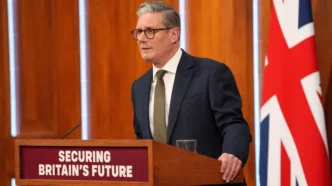The UK’s latest trade deals with India and the United States are being billed as landmark moments in Britain’s post-Brexit trade strategy. But while officials tout them as big wins, voices in the tech sector aren’t all cheering. Some welcome the potential for innovation and international growth, while others warn that regulatory uncertainty and political posturing still loom large.
At the heart of both agreements is the UK’s attempt to cement its independent global trade identity. The India deal followed a classic negotiation model—three years of detailed talks, culminating in an agreement that’s expected to boost bilateral trade by over £25 billion by 2040. In contrast, the deal with the US took a more unconventional path, shaped heavily by Trump-era politics. It was long on bold promises, short on specifics.
Despite their differences, both deals will have a ripple effect on British tech and innovation. And not everyone’s interpretation of their value is the same.
Tech Sector Sees Promise in Cross-Border Growth
For many in the UK tech ecosystem, the agreement with India is a signal of deeper economic alignment with one of the world’s fastest-growing digital economies. Zaki Farooq, CTO and Co-Founder of PayFuture, called the deal “a catalyst for deeper integration between two of the world’s most dynamic economies.”
He emphasized that lower tariffs and broader access to sectors like procurement and services open doors for UK-based SMEs aiming to scale globally. “It’s not just the big players who benefit. These agreements create room for startups and growing businesses to expand internationally without overwhelming red tape.”
That optimism is echoed by Martin Neale, co-founder of public sector AI firm ICS.AI. Although his business focuses on UK clients, he sees clear benefits. “Better access to hardware through trade agreements means we can improve the AI tools local councils and healthcare providers depend on,” Neale said. “If these deals make government services more efficient and citizen-friendly, that’s a real outcome.”
Behind the Headlines: Why Cooperation Matters More Than Tariffs
Much of the public debate has centered on tariff levels, but tech leaders argue that regulatory clarity and smoother cross-border cooperation are often more important than customs rates. A 0% tariff doesn’t help if other barriers—like inconsistent regulations or delayed approvals—block actual progress.
Neale pointed out that the real value lies in mutual understanding on emerging technologies. “This isn’t just symbolic. A UK AI company like ours benefits enormously from more consistency in how AI is regulated across borders. That clarity is crucial for innovation.”
Farooq also stressed the importance of interoperability in financial systems, particularly with new compliance standards emerging in India. “We’re preparing for upcoming regulations like India’s Cross Border Payment Authorization requirements. Deals like this help ensure financial flows stay smooth and uninterrupted,” he noted.
For startups eyeing US expansion, the tone is more bullish. Mark Pearson, founder of Fuel Ventures, called the US trade agreement a “win for UK startups.” He believes it removes major roadblocks to entering a huge market hungry for innovation. “This is about more than trade—it’s about giving UK founders a clear path to customers, partnerships, and growth across the Atlantic.”
A Word of Caution: Tech Leaders Warn of Ongoing Uncertainty
Not everyone is ready to celebrate. While the agreements may promise smoother trade, some experts warn the reality could remain bumpy.
TechMarketView’s chief analyst, Georgina O’Toole, urged companies to stay vigilant. “We’re in an era of unpredictable trading conditions,” she said. “Tech firms should double down on supply chain flexibility, geographic diversity, and the ability to pivot fast.”
The deal with the US, in particular, still lacks many details. Neale warned that unless it translates into better delivery of public services, it could end up as little more than a headline. “What matters isn’t the photo op—it’s whether frontline healthcare workers and citizens actually benefit from improved tech and services. That’s the true test.”
O’Toole went further, labeling the US deal “a limited relief measure rather than a transformative agreement.” In her view, it doesn’t erase the uncertainty created by Trump’s protectionist stance. “It’s a temporary patch, not a long-term solution,” she added.
UK Trade Deals Are a Start, But Global Trade Is Still in Flux
While the UK’s bilateral moves matter, global trade dynamics remain in flux. China, the EU, and other major players haven’t yet made significant moves to match. That puts the UK’s agreements in perspective.
“Our deal is a side show,” O’Toole said bluntly. “Until there’s progress on big-ticket relationships like US-China, the broader trade landscape remains stuck.”
So while the UK’s new trade deals mark an important shift—and offer genuine promise for the tech sector—many founders, analysts, and operators are keeping both eyes on what comes next. For now, it’s less about fanfare and more about execution.













